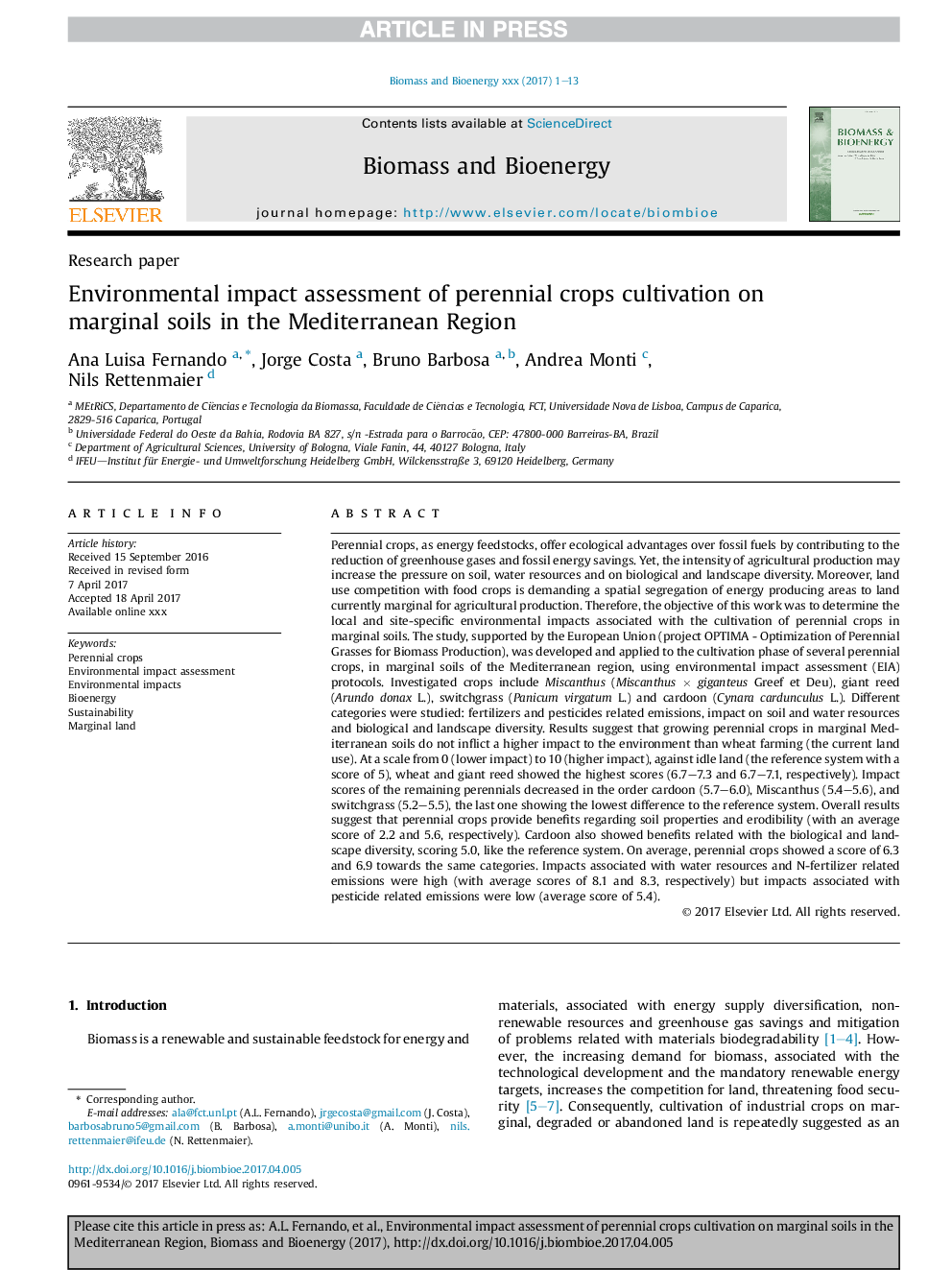| کد مقاله | کد نشریه | سال انتشار | مقاله انگلیسی | نسخه تمام متن |
|---|---|---|---|---|
| 7062958 | 1459782 | 2018 | 13 صفحه PDF | دانلود رایگان |
عنوان انگلیسی مقاله ISI
Environmental impact assessment of perennial crops cultivation on marginal soils in the Mediterranean Region
ترجمه فارسی عنوان
ارزیابی تاثیرات زیست محیطی کشت محصولات چندساله در خاک های حاشیه ای در منطقه مدیترانه
دانلود مقاله + سفارش ترجمه
دانلود مقاله ISI انگلیسی
رایگان برای ایرانیان
کلمات کلیدی
محصولات چند ساله، ارزیابی اثرات زیست محیطی، اثرات زیست محیطی، بیو انرژی، پایداری، سرزمین حاشیه،
موضوعات مرتبط
مهندسی و علوم پایه
مهندسی شیمی
تکنولوژی و شیمی فرآیندی
چکیده انگلیسی
Perennial crops, as energy feedstocks, offer ecological advantages over fossil fuels by contributing to the reduction of greenhouse gases and fossil energy savings. Yet, the intensity of agricultural production may increase the pressure on soil, water resources and on biological and landscape diversity. Moreover, land use competition with food crops is demanding a spatial segregation of energy producing areas to land currently marginal for agricultural production. Therefore, the objective of this work was to determine the local and site-specific environmental impacts associated with the cultivation of perennial crops in marginal soils. The study, supported by the European Union (project OPTIMA - Optimization of Perennial Grasses for Biomass Production), was developed and applied to the cultivation phase of several perennial crops, in marginal soils of the Mediterranean region, using environmental impact assessment (EIA) protocols. Investigated crops include Miscanthus (Miscanthus Ã giganteus Greef et Deu), giant reed (Arundo donax L.), switchgrass (Panicum virgatum L.) and cardoon (Cynara cardunculus L.). Different categories were studied: fertilizers and pesticides related emissions, impact on soil and water resources and biological and landscape diversity. Results suggest that growing perennial crops in marginal Mediterranean soils do not inflict a higher impact to the environment than wheat farming (the current land use). At a scale from 0 (lower impact) to 10 (higher impact), against idle land (the reference system with a score of 5), wheat and giant reed showed the highest scores (6.7-7.3 and 6.7-7.1, respectively). Impact scores of the remaining perennials decreased in the order cardoon (5.7-6.0), Miscanthus (5.4-5.6), and switchgrass (5.2-5.5), the last one showing the lowest difference to the reference system. Overall results suggest that perennial crops provide benefits regarding soil properties and erodibility (with an average score of 2.2 and 5.6, respectively). Cardoon also showed benefits related with the biological and landscape diversity, scoring 5.0, like the reference system. On average, perennial crops showed a score of 6.3 and 6.9 towards the same categories. Impacts associated with water resources and N-fertilizer related emissions were high (with average scores of 8.1 and 8.3, respectively) but impacts associated with pesticide related emissions were low (average score of 5.4).
ناشر
Database: Elsevier - ScienceDirect (ساینس دایرکت)
Journal: Biomass and Bioenergy - Volume 111, April 2018, Pages 174-186
Journal: Biomass and Bioenergy - Volume 111, April 2018, Pages 174-186
نویسندگان
Ana Luisa Fernando, Jorge Costa, Bruno Barbosa, Andrea Monti, Nils Rettenmaier,
